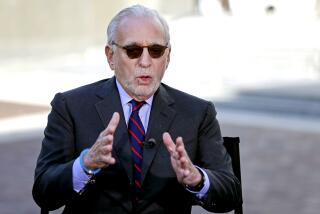Combining Share Votes With Virtue for Social Change : Activism: The Adrian Dominican Sisters seek economic justice along with returns on their retirement investments.
- Share via
ADRIAN, Mich. — The Adrian Dominican Sisters never wanted to take on Anheuser-Busch, the huge company that brews Budweiser and other beers.
*
“We didn’t want to be characterized as teetotalers. You open up any of our refrigerators and you’re going to find beer and wine,” Sister Pat Siemen explained with a grin.
But the nuns were angry at the thought of teen-agers enticed to drink by ads featuring attractive, youthful models.
So this spirited, unconventional collection of holy activists joined other groups to put pressure on the St. Louis-based company. They demanded in calls, letters and a shareholder resolution this year that Anheuser-Busch look at how its marketing campaigns affected young people.
The Adrian Dominicans have now spent 20 years as shareholder activists, using their investment portfolio as a means of achieving social change.
“They are definitely a leader. They do it all,” said Timothy Smith, executive director of the Interfaith Center for Corporate Responsibility. A division of the National Council of Churches, the 25-year-old group helps coordinate efforts for religious investors.
Smith said the Adrians are revered as much for their willingness to tackle controversial questions as for the many fronts on which they fight social injustice.
The 1,230-member congregation has used its pocketbook to pursue change in many ways. For example, members developed a $2-million revolving-door fund from which they grant low-interest loans to social service groups.
They have also instructed the managers of their multimillion-dollar stock portfolio not to buy shares in tobacco companies. And when voting for the board of directors of a company in which they own stock, the Dominicans refuse to cast a ballot if there are no female candidates.
The nuns’ decision in 1975 to become activist shareholders came from a need to do more than their direct work in underprivileged communities around the world. So they went behind company lines, using their standing as stockholders and moral authority as nuns to try to shape policy at some of America’s biggest corporations.
“It’s kind of like the gnat and the elephant,” Siemen noted dryly.
Her characterization may be correct regarding the nuns’ fiscal might.
Most of the money they invest comes from funds set aside for the sisters’ retirement, the rest from the congregation’s general budget. And it is rare that a shareholder resolution they offer passes when voted upon by other stockholders.
But their concerns generate publicity, which along with dialogue and negotiation have become their most effective tools.
“We don’t go in as enemies,” Siemen said. “After all, we’re shareholders. . . . We have to make money on our investments.”
They rarely confront an issue--or a company--without linking with other groups, usually though the Interfaith Center.
Religious investors in the United States have a combined portfolio of about $45 billion. Although they include Protestant churches and their pension funds, most are Roman Catholic groups.
This year, religious investors sponsored about 180 shareholder resolutions involving 133 companies. As in most years, none passed when voted on and about one-third were withdrawn before annual meetings because negotiations with the companies produced results, Smith said.
One of the first major campaigns for the Adrian Dominicans came almost immediately after they launched their corporate responsibility program. They began urging Gulf & Western Industries Inc., now Paramount Communications Inc., to improve conditions for workers in its Dominican Republic sugar cane fields.
Sister Carol Coston vividly remembers speaking at the company’s shareholders meeting in a glitzy Palm Beach hotel. She had just returned from the Caribbean nation, where she and representatives from other religious groups found employees living on subsistence wages in shacks without water or toilets.
“To try to bring to that group the reality of what we had just seen--they just didn’t want to hear it,” Coston said. “It was such a jarring contrast.”
Gulf & Western eventually began providing updates to shareholders and improving the workers’ situation, Smith said. How much of a role the religious shareholders’ pressure played was unclear.
The Adrian Dominicans also challenged Coca-Cola Co.’s involvement in South Africa when that country’s apartheid government was in place.
In 1986, after years of pressure from numerous religious, civil rights and university groups, Coca-Cola became one of the largest companies to pull out of South Africa by divesting its bottling plants there. But it still sold its concentrate to locally owned bottlers.
To protest the company’s continued presence, the nuns dumped their 53,000 Coca-Cola shares in 1989 and pelted the company’s executives with letters. They also removed Coke vending machines from their buildings and the nearby Adrian-founded Siena Heights College campus and boycotted Coke products.
Coca-Cola never stopped selling to local distributors and retained a 75% share of South Africa’s soft drink market. Last year, after the end of apartheid, the company announced it was returning its own distributors to South Africa.
This year, a shareholder resolution sponsored by the Franciscan Sisters of La Crosse, Wis., and The Marin Institute for the Prevention of Alcohol and Other Drug Problems asked Anheuser-Busch to look at the impact of its advertising on young people. The Adrians supported it, but became involved in the issue too late to be formally recognized as a co-sponsor.
The resolution failed, receiving only 6.7% of the vote at Anheuser-Busch’s April annual meeting.
But the sisters regard that as a win. The votes were sufficient to bring the question back on next year’s proxy statement.
“It may not look like success today, but in the future it might,” said Sister Mary Jo Shingler.
Anheuser-Busch denies its marketing is aimed at teen-agers. The $150 million the company has spent since 1982 on preventing underage drinking, alcohol abuse and drunken driving shows the company is serious about the problem, said Francine Katz, vice president of consumer awareness for Anheuser-Busch.
But while disputing many of the nuns’ opinions, some corporate targets also respect them.
After Sister Annette Sinagra collapsed in May at a shareholder meeting and required brain surgery, Coca-Cola sent flowers to her hospital room.
And, said Katz of Anheuser-Busch, “Sister Annette is a very open and charismatic individual. We welcomed the opportunity to engage in a dialogue [with her].”
The sisters’ faith in their mission seems unfaltering. Still, they acknowledged the outlook for achieving significant social change often seems bleak.
“As time goes on, it’s getting harder and harder to do this job,” Shingler said.
Siemen agreed: “I think the challenge is going to increase as the economy gets tighter.”
More to Read
Eat your way across L.A.
Get our weekly Tasting Notes newsletter for reviews, news and more.
You may occasionally receive promotional content from the Los Angeles Times.










